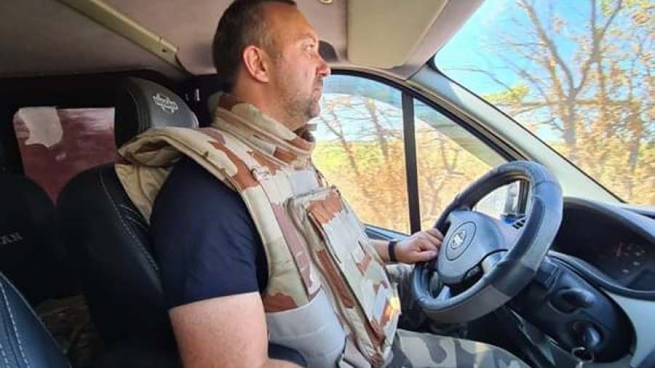Who are the people taking part in this course?
The course was designed specifically for Ukraine and the Middle East. Catechists, teachers and psychologists have come from Ukraine from Salesian homes and also from the Donetsk Exarchate, because half of their territory is occupied and they must contribute to the healing of these wounds caused by war. The course is very interesting, because it deals with topics relating to the traumas that war produces: traumas that unfortunately we do not always see during conflicts, psychological wounds can open even a few years after the war. Let's talk, for example, about mourning. It is a very useful topic because we often deal with people who have lost a child, a husband or a parent in war. They explained to us what we can ask, what to talk about and what not to talk about. For example, one syaing that can traumatise is: "Everything will be fine". It should not be said, because who are we to be able to say that everything will be fine? And then they also explain other things to us and this is very important for us, because in the Ukraine there is a lack of psychologists who can work with civilians or with the military, while unfortunately in the future the need for psychologists will grow. This certainly does not make us psychologists, but at least we have a way to give first aid of this kind to people suffering from the traumas of war.
How have you personally experienced the accompaniment of people who have suffered the loss of loved ones, in these more than two years of large-scale war? What do you think is important to remember when trying to bring comfort to someone?
When people are grieving, they often don't listen with their ears, but they do it with their hearts. Bereaved people are often angry at the world. This is why it is very difficult: the words to use depend on the situation, but above all presence, your presence is important. Being close helps a lot. For example, in the early days of the war, when they asked me: "Where is this God? Can we not see him? Here everything is destroyed, there are many deaths", I did not answer, but I stayed with these people and then they told me: "Now we see God in your presence among us".
Even here, when someone has lost a loved one and we are close to them, we often do not have to immediately "jump" in with words, because if you use words, it seems that you want to become a teacher, someone giving advice. But the individual suffering does not want a teacher at that moment, rather someone who is close to them to whom they can talk about pain they are feeling.
When communicating with people in such difficult contexts, what should you consider in order not to risk hurting them?
First of all, you have to let people get used to the new situation. Don't try to talk right away, but ask how things are. There's no need to ask too many questions. Better to wait for the person to get used to it and then slowly start talking. Because those who survived the war are feeling so many emotions. And, believe me, the majority, 90% of those who lived through the war, will gradually end up talking about a lot of things.
It is very difficult to understand someone who has come from the war. For example, let me talk about myself: I arrived in Italy and someone invited me to go somewhere, someone else told me: “Let's go to Turin to visit friends”, and I replied: "Excuse me, I'm staying in Rome because I'm so tired". And it's not about physical fatigue, like when you want to go to sleep. It's a psychological fatigue, that you don't want to go anywhere but just relax, maybe walking around Rome, just looking at the parks. It is a fatigue that no one can understand if they do not have this drama behind them. The psychological fatigue caused by the war is very great.
Since the beginning of the war he has never stopped supporting people in areas very close to the front line. His mission, he told us, is to help people remain "human"...
Yes, I got more than 500 people to flee from very dangerous areas, where others did not go. If 10% of those people at the time of evacuation have said thank you to me, it will be a lot. But the important thing is that after a year, after two years I get messages that say: "You saved us on that occasion. We will always remember this and we are grateful." And I don't even know who these messages are from. For example, I see these people I helped escape and now they have a life again and I think, "Where would this boy or girl, this family be if I hadn't helped them?"
I am happy because it is said that it is necessary to live one's life fully – and even more so to live the priestly life fully – and I believe that it is the most beautiful thing I could have done in life. Because life gives you a chance and you say to yourself: this can be the greatest thing in your life and therefore I either accept it or I do not accept it. Either I throw myself in or I do not throw myself in. And when you jump in, you see that you have done many beautiful things and you have remained alive, because even this is not obvious, that you have responded to the demands of your life and that all this is beautiful.
Many people thanked me and many said, “I see God through you.” So let's continue to help, to work in the parishes, helping those on the front line.
Svitlana Dukhovych
Source: Vatican News


